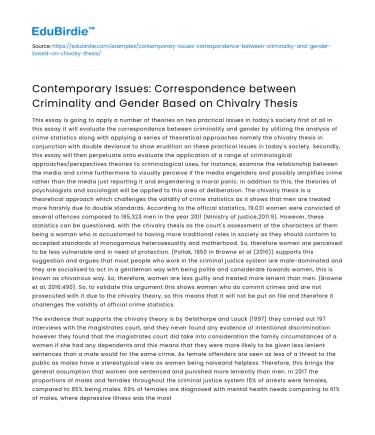Introduction
The concept of the chivalry thesis posits that women are treated more leniently than men by the criminal justice system due to societal perceptions of women as inherently less culpable. This theory, originating from criminological studies in the mid-20th century, suggests that chivalry—a cultural norm dictating that women should be protected and treated gently—pervades the legal process. In contemporary society, where issues of gender equality and discrimination are at the forefront, the validity and implications of the chivalry thesis remain hotly debated. This essay explores the chivalry thesis within the context of current criminal justice practices, examining its influence and relevance while considering counter-arguments that highlight systemic biases against women, thereby providing a nuanced understanding of gender dynamics in criminality.
Gender Bias and the Chivalry Thesis
The chivalry thesis suggests that female offenders are often perceived through a lens of leniency, resulting in lighter sentences compared to their male counterparts for similar crimes. This perception is rooted in traditional gender roles that view women as less threatening and more amenable to rehabilitation. Studies such as those conducted by Daly and Bordt (1995) have indicated that women receive more lenient treatment in the judicial process, with factors such as family responsibilities and perceived vulnerability contributing to this disparity. For instance, women are often granted probation or community service in lieu of imprisonment, reflecting a judicial inclination towards preserving familial structures.
Save your time!
We can take care of your essay
- Proper editing and formatting
- Free revision, title page, and bibliography
- Flexible prices and money-back guarantee
However, the chivalry thesis is not without its criticisms. Critics argue that it oversimplifies the complexities of gender bias in the legal system. As noted by Steffensmeier et al. (1993), the leniency shown towards women can be contingent upon their conformity to traditional feminine stereotypes. Women who deviate from these norms, such as those involved in violent crimes or who exhibit "masculine" traits, may not benefit from such leniency. Furthermore, the thesis does not account for intersectional factors, such as race and socioeconomic status, which can exacerbate disparities within the justice system. The intersection of these factors indicates that the chivalry thesis may not be universally applicable, as it fails to capture the nuanced realities faced by diverse groups of women.
The transition from understanding gender bias through the lens of the chivalry thesis to acknowledging its limitations invites a broader examination of how systemic structures perpetuate inequality. The next section delves into alternative perspectives and counter-arguments that challenge the notion of chivalry in the criminal justice system, highlighting areas where women may encounter discrimination rather than leniency.
Counter-Arguments: Discrimination Against Women
While the chivalry thesis posits leniency towards female offenders, alternative perspectives argue that women, in fact, face significant discrimination within the criminal justice system. Feminist criminologists assert that the system is inherently patriarchal, often penalizing women more harshly when they transgress traditional gender roles. Cases involving women who commit violent crimes frequently reveal harsher sentencing due to perceptions of these women as doubly deviant—violating both legal and gender norms. For example, the case of Aileen Wuornos, a female serial killer, exemplifies this bias, as her actions were sensationalized in media narratives that emphasized her divergence from expected feminine behavior.
Moreover, women accused of crimes related to motherhood or domestic roles, such as child neglect or infanticide, may experience compounded scrutiny and moral judgment. This scrutiny often leads to punitive measures that reflect societal expectations of women as caregivers. A study by Chesney-Lind (2006) highlights that women in such cases are subjected to moralistic judgments that influence judicial outcomes, suggesting that the perceived leniency of the chivalry thesis is context-dependent and not universally applicable.
Additionally, the chivalry thesis fails to account for the institutional barriers women face within the legal system. Women often lack access to adequate legal representation and resources, which can result in unfavorable outcomes. The intersectionality of gender with other identities, such as race and class, further complicates the narrative, as marginalized women are disproportionately affected by systemic biases. This complexity necessitates a reevaluation of the chivalry thesis, considering the broader socio-legal dynamics that shape women's experiences in the criminal justice system.
The transition to the conclusion will synthesize the insights gained from examining both the chivalry thesis and its criticisms, offering a comprehensive perspective on the interplay between gender and criminality.
Conclusion
In conclusion, the chivalry thesis presents a compelling argument regarding gender bias in the criminal justice system, suggesting that women are often afforded leniency due to societal perceptions. However, this theory has limitations, as it does not fully capture the complexities and intersectional factors that influence judicial outcomes for women. The examination of counter-arguments reveals that women can experience discrimination, particularly when they transgress traditional gender norms or belong to marginalized groups. Therefore, while the chivalry thesis provides a framework for understanding gender dynamics in criminality, it must be considered within the broader context of systemic inequalities and the multifaceted nature of discrimination. Future research and policy-making should aim to address these complexities, ensuring that the criminal justice system operates equitably, free from gender bias.






 Stuck on your essay?
Stuck on your essay?

